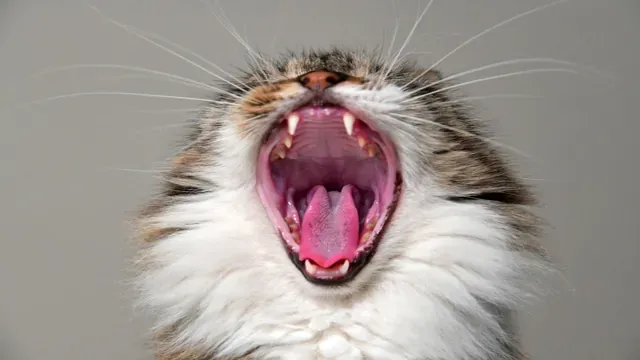Cat dental care is essentially a constant battle against plaque and tartar buildup, just as it is in humans. Plaque is an invisible film that builds back up on teeth within twenty minutes of a professional cleaning. Tartar is mineralized plaque.
One of the goals of your regime of cat health care should be to slow this process down. You can do this by both regular brushing and by examining the teeth for plaque and tartar buildup to see if professional intervention is necessary.
What to Look For
Plaque and tartar are visible as yellow and brown deposits on the teeth. Plaque accumulates over the teeth and tartar is often most visible at the gum line. Regular cleaning with a toothbrush and toothpaste designed for cat health care can slow down deposit build-up. Pay special attention to the gum line an area that the toothbrush can't always clean adequately. Plaque and tartar at the gum line indicates that it's time for a professional cleaning
Cat Food and Dental Care
When it comes to cleaning teeth, dry cat food is best. Wet food doesn't provide the abrasion that dry food does. Dry, crunchy food can scrape plaque deposits off as the cat eats, to some degree.
Recently, cat food companies have developed tooth-cleaning cat food: food that is specially formulated to promote healthy teeth. The food is abrasive enough that it scrapes tartar and plaque off the teeth, and some products even leave small crystals embedded in the plaque that work to break down plaque even when the cat isn't eating.
The science of dental care and cat food is just beginning to reach pet food stores. Only time will tell how efficient such products actually are. While they may prove to be a valuable ally in the war against plaque and tartar, regular brushing and inspection remain the most efficient of techniques for healthy, clean feline teeth.
When Dental Care Hurts
If your cat expresses discomfort or physical pain while you're brushing her teeth, you may have stumbled across a broken or infected tooth or an exposed root. Obviously, advanced dentistry isn't going to be part of your at-home cat health care program, and this is going to require a trip to your vet's for medical treatment.
Brushing your cat's teeth shouldn't cause pain. Any indication that it does suggests the existence of a dental problem that requires prompt attention.

